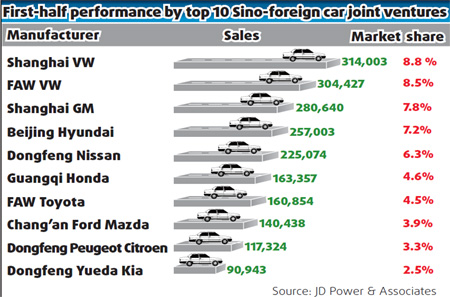

|
Senior management of joint venture companies must build fruitful relationships in order to succeed in China's highly competitive vehicle market. Zhang Binggou |
American-born Chinese executive Matt Tsien has been executive vice-president of SAIC-GM-Wuling (SGMW) since January and his humble little office at the southern China plant is a symbol of the joint venture's success.
It has no 200-year-old mahogany table, no plush leather furniture or expensive art on the plain walls.
His simple office is just like all the other Chinese executive offices at the plant: neat, clean and very functional.
Based in Liuzhou in the Guangxi Zhuang autonomous region, the SGMW plant was once an old tractor factory but is now a modern auto plant using the world's best practices.

The joint venture saw its first-half sales rise 50 percent in 2009 to 524,598 units thanks to minivans such as the Sunshine and an upgraded Rongguang model.
Tsien speaks fluent Chinese, has a master's degree in electrical engineering from Stanford University and a master's degree in management from the Massachusetts Institute of Technology.
The 48-year-old father of one supported GM's negotiations with SAIC in its early joint ventures, crafted GM's initial five-year business plan, and helped forge cooperation between GM and the Chinese government, industry and academic communities.
Despite his stellar qualifications and enviable nuts-and-bolts China experience, the GM executive believes what he's doing now at the joint venture is the most exciting time in his career.
This passion and his ability to smoothly work with his local coworkers on an equal level is one of the major reasons why GM is a winner in its joint ventures.
The world's best motoring minds have been coming to China for decades and their joint venture adventures have given them the ride of their lives. Volkswagen and General Motors are success stories that leap from the pages of China's colorful auto history annals.
Lessons of mistakes
But other auto industry expats have failed miserably because they were unable to work successfully with their Chinese partners.
They have been unable to accept the differences and then form trusting relationships with their new partners.
Fiat's failure with Nanjing Auto is the obvious example. Analysts say internal disagreements between foreigners and the Chinese caused the fall, and one of the telling signs of disarray was the high turnover of senior staff. From 2003 to 2007, the partnership replaced its sales and marketing chief seven times and its president four times. Were these executives pushed or did they jump?
One thing we do know is that Fiat will learn from past mistakes in its new partnership with Guangzhou Automobile Group.
The new Italian executives bound for China will know that relationships are key and will better understand the importance of patience, flexibility and accepting different ways of doing things.
A "my way or the highway" mindset doesn't work in a joint venture and the first vice-chairman of Shanghai Volkswagen Martin Posth is a man who knows how things work.
His book 1,000 Days in Shanghai: The Volkswagen Story - The First Chinese-German Car Factory is compulsory reading for any new motoring executive bound for China.
After seeing Chinese workers banging on iron sheets in rundown workshops in 1984, Posth was doubtful VW could ever work with the locals. And one of his biggest challenges, he said, was not managing Chinese staff, but rather his fellow Germans.
In his book, he said translators walked off the job in frustration when major misunderstandings erupted between the straight-talking Germans and nuance-laden Chinese.
But despite the challenges, Posth left China in 1988 with Shanghai Volkswagen zooming down the highway. Last year, China's first joint-venture car company produced its 4 millionth car.
Building trust

Posth says the success of a joint venture in China depends not on how a foreign firm can "dominate" but on how it can build "trust" and collaborate in an "honest" way with Chinese partners.
He says a motor executive needs "good nerves, the right arguments, and most importantly patience and endurance".
And accepting the way things are, rather than the way things are "supposed to be", is a key to surviving and succeeding in any joint venture in China.
I recommend that a foreign motoring executive get behind the wheel of a car and actually drive on Chinese roads because what will unfold will offer special insight.
At first, things may appear chaotic as many drivers ignore road rules but when one accepts the way things are - not the way they are "supposed to be" - life in China becomes a lot easier.
One night last week in Beijing, I was test-driving the new-look VW Passat Lingyu and while waiting at a red light, a taxi suddenly raced inches pass my vehicle, left to right. The cabbie used the pedestrian crossing to make an outrageous U-turn. Instead of beginning this maneuver from the left lane, he used the extreme-right bicycle lane looping past three lanes of traffic.
It was a shocking and funny event, but I had seen this before, accepted it and moved on with the majority of Chinese motorists who were doing the right thing.

(China Daily 08/10/2009 page7)













